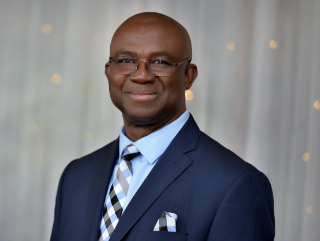Black History Month: Alumnus Peter Obiefuna remains inspired by community
Carmen Rojas - 18 February 2022

When Peter Obiefuna (’18 NCA) arrived in Edmonton over 17 years ago, he was already accustomed to taking on major life changes.
Canada was the fourth country he was living in, after growing up in Nigeria and spending time in both Jamaica and the United States. He also already had two successful careers under his belt — first as a physiology lecturer and then as a software architect.
After he and his wife settled in Canada to raise their children, Obiefuna tapped into a long-held passion by volunteering with the Edmonton Police Service (EPS) as a member of the African Community Liaison Committee (ACLC).
“I have always been fascinated by logic and reason, and passionate about justice and fairness,” said Obiefuna.
The goal of the committee was “to help build bridges and foster cooperation, mutual respect and trust between marginalized or minority communities on one hand and the EPS on the other,” he said.
Obiefuna’s experience volunteering on the ACLC, and seeing “the impact of the law on the daily lives of people,” ended up being the spark that illuminated the path to his next major life change: a career in law.
Driven by a desire to understand the law better so he could serve his community better, Obiefuna eventually became a student in the University of Alberta Faculty of Law’s Internationally Trained Lawyer Pathway program. He first completed the online LLB program at the University of London, and after graduating in 2016, decided he wanted to take his knowledge a step further.
That’s when his journey as a student in the pathway program—an initiative where foreign-trained lawyers can complete the Federation of Law Societies of Canada’s National Committee on Accreditation (NCA) process and practise law in Canada—began.
“The U of A experience provided the opportunity to learn Canadian law alongside regular law students,” Obiefuna said. “It also provided me with a unique networking opportunity with my future colleagues in a way that only in-class training could.”
He looks back at his time on campus with an appreciation for all the instructors, NCA coordinators and staff he encountered. “Each one imparted something remarkable and useful,” he said.
Obiefuna completed the NCA program in 2018 and went on to secure an articling position with Law Depot, after which he decided to establish a solo practice, Arizen Law.
Along with the challenges every new lawyer faces, such as adjusting to life outside the classroom, Obiefuna soon faced the added complexity of the COVID-19 pandemic.
“Every business suffered the impact of the pandemic, but there were unique challenges encountered by new businesses such as mine,” he said. “But all said, I was very fortunate to be surrounded by my more experienced lawyer friends and a very supportive family.”
Obiefuna points to this type of support network as being key to all students and new lawyers. “My best advice is to proactively establish a mentoring relationship with experienced lawyers in your chosen field,” he said.
For Black law students in particular, he offers this advice to those embarking on their law careers: “Cast a wide net — look for positions everywhere — but be deliberate about seeking out law firms that are affiliated to your cultural community organizations and approach them for help.”
The community-mindedness that first inspired Obiefuna to pursue law continues to be a driving force. Currently operating retirement hours at his firm, focused on Wills and Estate Law, Obiefuna says he prioritizes community service as a way of giving back.
This includes taking part in speaking engagements where he shares his rich personal experiences and offers advice in areas such as retirement planning and raising families in a multicultural environment.